Featured
 What Trump Could Do With a Second Term. The Atlantic Staff
What Trump Could Do With a Second Term. The Atlantic Staff
The staff of The Atlantic on the threat a second term poses to American democracy. In the January/February issue of The Atlantic, 24 writers explain how Donald Trump could destroy America’s civic and democratic institutions, including its courts, national political culture, and military, if he succeeds in returning to the Oval Office. Read more or click below
David Frum on autocracy
Anne Applebaum on NATO
McKay Coppins on the loyalists
Caitlin Dickerson on immigration
Barton Gellman on the Justice Department
Sophie Gilbert on misogyny
Zoë Schlanger on climate
George Packer on journalism
Sarah Zhang on science
Franklin Foer on corruption
Michael Schuman on China
Adam Serwer on the courts
Juliette Kayyem on extremism
Elaine Godfrey on abortion
Megan Garber on disinformation
Clint Smith on history
Related: Liz Cheney: A Republican House Majority in 2025 Is a ‘Threat’ To The U.S. By / HuffPost
Political / Social
 A Trump Dictatorship Is Not “Inevitable”—as Long as We Step Up Now. By Joan Walsh / The Nation
A Trump Dictatorship Is Not “Inevitable”—as Long as We Step Up Now. By Joan Walsh / The Nation
The disgraced former president almost surely has a lock on the GOP nomination. But that doesn’t mean he’ll win in 2024.
It’s important to look clearly at the devastating consequences of a second Trump term. I almost wrote “unthinkable” consequences, but we can think about them, and we should. We should not paralyze ourselves with alarm, or divide into panicky factions searching for a political savior. “Authoritarians create a climate where they seem unstoppable,” author Ruth Ben-Ghiat told The Washington Post’s Greg Sargent, who wrote in a similar vein on Tuesday. “Creating an aura of destiny around the leader galvanizes his supporters by making his movement seem much stronger than it actually is. The manipulation of perception is everything.” Squabbling among Democrats makes the anti-Trump movement look weaker. Enjoy the holidays as we hurtle towards 2024. Then buckle down to work. Read more
 Alabama and Georgia Defy Federal Courts on Redistricting. By David A. Graham / The Atlantic
Alabama and Georgia Defy Federal Courts on Redistricting. By David A. Graham / The Atlantic
A series of southern states have ignored federal court rulings on voting rights.
When, earlier this year, Alabama simply refused to draw congressional maps that complied with a federal court order, the decision looked like an outlier—a disturbing one, but an outlier nonetheless. Now it’s starting to look more like an early warning. On Friday, the Georgia state legislature released maps that appear to defy a federal judge’s ruling. Meanwhile, legislators in Louisiana have had their deadline extended to fix congressional districts that also didn’t pass judicial review. Read more
Related: Digital Redlining and the Black Rural South. By
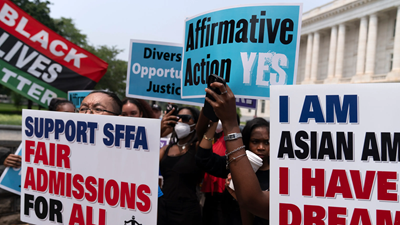 After Supreme Court ruling on affirmative action, college counselors shift strategy. By Liz Willen / USA Today
After Supreme Court ruling on affirmative action, college counselors shift strategy. By Liz Willen / USA Today
Striding into a packed community center filled with high school seniors, Atnre Alleyne has a few words of advice for the crowd, members of the first class of college applicants to be shaped by June’s Supreme Court ruling striking down race-conscious admissions.
“You have to get good grades, you have to find a way to do the academics, but also become leaders,” said Alleyne, the energetic co-founder and CEO of TeenSHARP, a nonprofit that prepares students from underrepresented backgrounds for higher education. “In your schools, do something! Fight for social justice.” Read more
Related: Supreme Court case could spark rush of reverse-discrimination claims. By Julian Mark / Wash Post
 African Americans, the Palestinian People, the Jewish People. By Brian Gilmore / Goodmenproject
African Americans, the Palestinian People, the Jewish People. By Brian Gilmore / Goodmenproject
African Americans understand this struggle. Like the Palestinian people, we know what it is like to be landless. We know what it is like to be stripped of our humanity. Our history informs us. We also know what it is like to be oppressed like the Jewish people have been historically worldwide.
The Jewish people in America and African Americans have had strong political connections across history. The biblical narrative of the Jewish people escaping bondage in Egypt still resonates with African Americans in their faith practices. Some Jewish Americans played a key role in the historical struggle of African Americans for basic rights in America. Read more
Related: Bowman Is Latest House Democrat to Face a Primary Over Israel Stance.
 Biden will sign an executive order on federal funding for Native Americans. By AP and NBC News
Biden will sign an executive order on federal funding for Native Americans. By AP and NBC News
President Joe Biden will sign an executive order on Wednesday during a tribal nations summit that aims to make it easier for Native Americans to access federal funding and have greater autonomy over how to invest those funds.
“Tribal nations still face unacceptable barriers to fully exercising their inherent sovereignty, and really too often that occurs because of the way we are administering federal funding programs,” said Neera Tanden, White House domestic policy adviser. Read more
Ethics / Morality / Religion
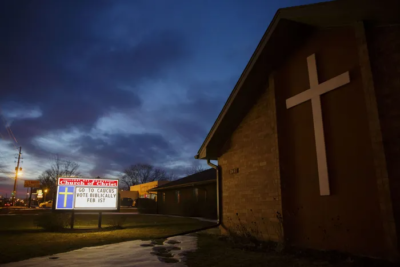 Tim Alberta Book Review: America’s White Evangelical Problem. By Sarah Jones / New York Intelligencer
Tim Alberta Book Review: America’s White Evangelical Problem. By Sarah Jones / New York Intelligencer
When the journalist Tim Alberta’s father unexpectedly died, another ordeal awaited Tim.
His father had pastored the Cornerstone Evangelical Presbyterian church in Michigan, where the Alberta family now gathered to honor his life alongside the congregation the father had nurtured. “None of us had slept much that week,” Alberta writes in his second book, The Kingdom, The Power, and the Glory: American Evangelicals in an Age of Extremism. Read more
 The cults that took over Christian colleges now aim to take over your government. By SemDem / Daily Kos
The cults that took over Christian colleges now aim to take over your government. By SemDem / Daily Kos
“Would you be OK with taking a pregnancy test to prove your innocence?”
There’s a place where pregnancy is a crime. I’m not talking about some future dystopian fiction, but rather what happens at Pensacola Christian College. Students who have attended school there say they are encouraged to turn in their peers, whether for a violation of one of their extensive rules, or more serious “crimes” like suspected homosexual activity or becoming pregnant. Lillith was seen throwing up in a garbage can, so informants reported her to Student Life. She was called to the dean’s office on a Sunday to take a pregnancy test. Read more
Related: What’s Really Going On With the GOP’s Current School Obsession. By Nicholas Serafin / Slate
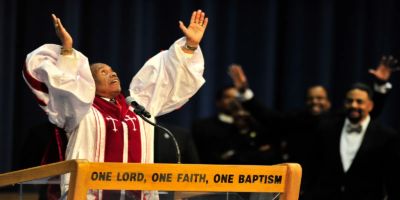 Well-known Detroit pastor the Rev. Charles G. Adams dies, but his legacy lives on. By Terrell Bailey / CBS News
Well-known Detroit pastor the Rev. Charles G. Adams dies, but his legacy lives on. By Terrell Bailey / CBS News
Longtime Detroit pastor, the Rev. Charles Gilchrist Adams, has died at age 86, reportedly from pneumonia.
Adams spent half a century as pastor of Hartford Memorial Baptist Church. He was a former member of the NAACP Detroit chapter executive board, serving as president in 1984. “Charles Adams went home empty..because he gave it all to us and for that, we are very grateful,” said the Rev. Wendell Anthony, NAACP Detroit chapter president. Known as the”prince of the pulpit,” Adams was a man of the people. Born in Detroit, he went to college and graduated from both the University of Michigan and Harvard University. Once in his career, he used the church to help spur revitalization throughout the city. Read more
Historical / Cultural
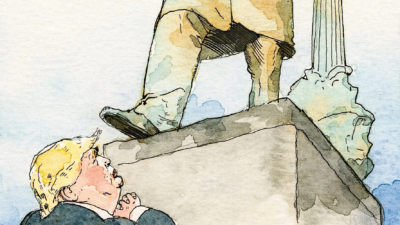 What Happened When the U.S. Failed to Prosecute an Insurrectionist Ex-President. By Jill Lepore / The New Yorker
What Happened When the U.S. Failed to Prosecute an Insurrectionist Ex-President. By Jill Lepore / The New Yorker
After the Civil War, Jefferson Davis, the President of the Confederacy, was to be tried for treason. Does the debacle hold lessons for the trials awaiting Donald Trump?
When Davis doddered into that courtroom, many of the faces he saw were Black. Among the two hundred spectators, a quarter were Black freedmen. And then the grand jury filed in. Six of its eighteen members were Black, the first Black men to serve on a federal grand jury. Fields Cook, born a slave, was a Baptist minister. John Oliver, born free, had spent much of his life in Boston. George Lewis Seaton’s mother, Lucinda, had been enslaved at Mount Vernon. Cornelius Liggan Harris, a Black shoemaker, later recalled how, when he took his seat with the grand jury and eyed the defendant, “he looked on me and smiled.” Not many minutes later, Davis walked out a free man, released on bail. Read more
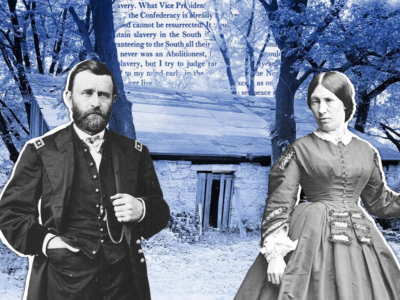 Unraveling Ulysses S. Grant’s Complex Relationship With Slavery. By John Reeves / Smithsonian Magazine
Unraveling Ulysses S. Grant’s Complex Relationship With Slavery. By John Reeves / Smithsonian Magazine
The Union general directly benefited from the brutal institution before and during the Civil War
At the beginning of the Civil War, Ulysses S. Grant wasn’t an abolitionist, admitting that his beliefs were “not even what could be called antislavery.” By August 1863, he had changed his mind, writing, “Slavery is already dead and cannot be resurrected.” Illustration by Meilan Solly / Photos via Wikimedia Commons, Library of Congress. Read more
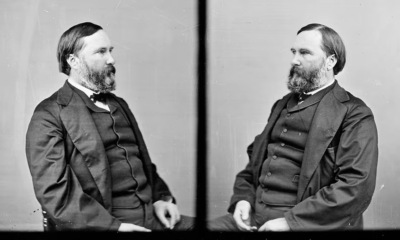 Longstreet: the Confederate general who switched sides on race. By Rich Tenorio / The Guardian
Longstreet: the Confederate general who switched sides on race. By Rich Tenorio / The Guardian
Elizabeth Varon considers how Robert E Lee’s lieutenant came to work for civil rights and fight white supremacist violence
On 14 September 1874, less than a decade after the end of the US civil war, the former Confederate general James Longstreet was back in arms. This time, he was seeking to prevent an insurrection: a white supremacist bid to take over New Orleans. Read more
 Trump Will Suppress American History. By Clint Smith / The Atlantic
Trump Will Suppress American History. By Clint Smith / The Atlantic
He has promised to impose his harmful, erroneous claims on school curricula in a second term.
As I contemplated Lee’s metal face glowing like a small sun in the dark universe of the workshop, I thought of the statement issued by former President Donald Trump when the statue had come down. “Robert E. Lee is considered by many Generals to be the greatest strategist of them all,” Trump had written, reaffirming his past praise for the Confederate leader. Trump was implicitly telling his base: They came for Lee, and next they will come for you. It’s not hard to see why the metalworkers who melted down the statue of Lee did so at an undisclosed location; they reportedly feared for their safety. Read more
 Budgets for ‘prestige’ films dried up. So Ava DuVernay found a new way. By Geoff Edgers / Wash Post
Budgets for ‘prestige’ films dried up. So Ava DuVernay found a new way. By Geoff Edgers / Wash Post
The filmmaker couldn’t get traditional financing to film “Origin” — but the Ford Foundation, Melinda Gates and other philanthropists were willing to help. It might be cinema’s new business model.
Sports
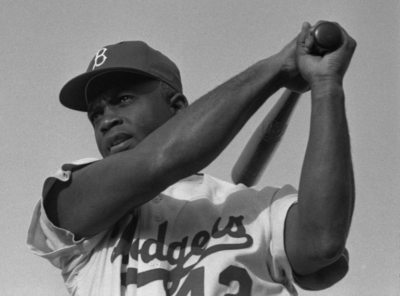 Rachel and Jackie Robinson and Housing Discrimination in Connecticut. By Seth S. Tannenbaum / AAIHS
Rachel and Jackie Robinson and Housing Discrimination in Connecticut. By Seth S. Tannenbaum / AAIHS
Jackie Robinson as a member of the Brooklyn Dodgers c. 1954. (Bob Sandberg/Wikimedia Commons)
While working on an op-ed about Rachel Robinson’s importance as a historical figure, I became intrigued with both Robinsons’ descriptions in their books of the housing discrimination that the family encountered when they tried to move from St. Albans, Queens, to a New York City suburb after the birth of their third child in 1952, and I wanted to learn more about it. Read more
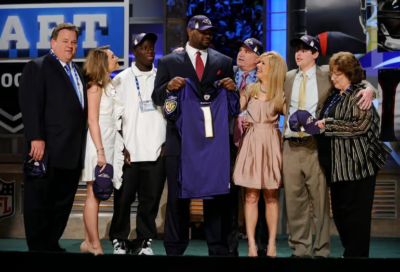 In ‘Blind Side’ case, Tuohys share texts to accuse Michael Oher of trying to extort $15 million. By Torrey Hart / The Athletic
In ‘Blind Side’ case, Tuohys share texts to accuse Michael Oher of trying to extort $15 million. By Torrey Hart / The Athletic
The Memphis couple depicted in the 2009 Oscar-winning film “The Blind Side,” who have been accused in court of shortchanging the football star Michael Oher over nearly two decades, alleged in new court filings that Oher sent them text messages and emails to try to extort them out of $15 million with threats of ruining the glossy depictions of their relationship.
In his petition, Oher requested the conservatorship be closed and asked for a full accounting of money earned off his name, image and likeness as well as back pay for money made through the conservatorship, which put the Tuohys in charge of Oher’s financial affairs at a time when he was considered a top NFL prospect. Read more
 AP African American studies adds lesson on sports and racial justice. By Nick Anderson / Wash Post
AP African American studies adds lesson on sports and racial justice. By Nick Anderson / Wash Post
Revisions to Advanced Placement African American studies follow criticism that the course was watered down. San Francisco 49ers Eli Harold, Colin Kaepernick and Eric Reid kneel during the national anthem before an NFL football game against the Dallas Cowboys in Santa Clara, Calif. (Marcio Jose Sanchez/AP)
The latest version of a groundbreaking African American studies course for the nation’s high schools says students should learn about professional football quarterback Colin Kaepernick and his decision in 2016 to kneel during the national anthem as a protest against racial oppression and police brutality. Read more
Site Information
Articles appearing in the Digest are archived on our home page. And at the top of this page register your email to receive notification of new editions of Race Inquiry Digest.
Click here for earlier Digests. The site is searchable by name or topic. See “search” at the top of this page.
About Race Inquiry and Race Inquiry Digest. The Digest is published on Mondays and Thursdays.
Use the customized buttons below to share the Digest in an email, or post to your Facebook, Linkedin or Twitter accounts.